 |
|
« News & Report | Speeches | Appeals | Feature Articles | Sino-Tibetan Dialogue | Blogs & Links | Press | Contact | 首頁 » |
• news & photos
![]() Tibetan version: Final Document of
the Sino-Tibetan Conference (August 8, 2009)
Tibetan version: Final Document of
the Sino-Tibetan Conference (August 8, 2009)
![]() Resolve the Issue of Tibet and Half a Million Careers Go Up
in Smoke (August 7, 2009)
Resolve the Issue of Tibet and Half a Million Careers Go Up
in Smoke (August 7, 2009)
![]() 'Expect No Miracle, But Strengthen Sino-Tibetan Friendship'
(August 6, 2009)
'Expect No Miracle, But Strengthen Sino-Tibetan Friendship'
(August 6, 2009)
Geneva, August 8, 2009
Final Document of the 2009 Sino-Tibetan Conference ‘Finding Common Ground’
in Geneva[1]
A Sino-Tibetan conference ‘Finding Common Ground’ was held in Geneva from 6−8 August 2009 attended by Chinese and Tibetan scholars, educators, writers and human rights advocates. The aims of the conference are to inform the Chinese people and the international community that Tibetan culture and way of life are gravely endangered and that the fundamental human rights of the Tibetan people are seriously being violated by the Chinese regime. In addition, the conference aims to outline effective measures to support the Tibetan people in their struggle to regain their freedom and to sustain and promote its unique culture. In this way, the conference will also respond to the heartfelt remarks made by His Holiness the Dalai Lama in His opening address.
Based on these aims, the conference has reached the following common positions:
I. Fundamental Values and Principles
The universal values established by the Universal Declaration of Human Rights, which include freedom, democracy, rule of law, human rights, equality and coexistence of multiple cultures, are the fundamental spiritual values and principles that the conference has followed.
II. The Origin and Nature of the Tibetan Issue
- The root cause of the Tibetan issue is not a conflict between the Chinese people and the Tibetan people, but rather the autocratic rule of the People’s Republic of China in Tibet and its cultural genocide in Tibet.
- The Beijing government’s claim that ‘Tibet has always been a part of China’ is factually incorrect.
- Tibetan culture, religion, language and way of life are on the verge of extinction.
- The Tibetan people have been deprived of their fundamental human rights including the rights to national self-determination, political participation and religious belief.
- The official media of the Chinese government distorts the nature of the Tibetan issue and incites confrontation between the two peoples.
III. Ways Towards Resolving the Tibetan Issue
- Respect the fundamental human rights of the Tibetan people, including the right to political participation and the right of religious freedom and belief.
- The resolution of the Tibetan issue is closely related to the democratization of China.
- The Chinese people should engage in a critical reflection on Han chauvinism and fully respect Tibetan culture and way of life.
- The Chinese government must comply with the principle of the rule of law.
- The participants fully respect the Middle-Way Approach proposed by His Holiness the Dalai Lama.
- The undeniable right of His Holiness the Dalai Lama to return to his homeland must be respected.
IV. Recommendations to the Tibetan Government in Exile
- To establish Sino-Tibetan friendship associations, Sino-Tibetan forums and civil society organizations across the world in order to promote cultural exchange and emotional ties between the two peoples.
- To establish a research institute for Chinese and Tibetan scholars to promote the study of Tibetan history and culture for the purpose of recovering historical facts.
- To adopt measures to counteract the blockage of information on His Holiness the Dalai Lama and the monopoly on Tibetan issues by the Chinese regime, which would facilitate access to independent information for the Chinese people and the international community.
- To create favorable conditions for His Holiness the Dalai Lama to promote his values to the Chinese community as a contribution to the renewal of spiritual values amongst the Chinese people.
The common wish of this Sino-Tibetan conference is for the Tibetan people to regain freedom and to prevent the extinction of Tibetan culture. We share a fundamental belief: freedom is the highest value; Tibetan culture is a precious treasure among the many cultures of humanity. Without freedom for Tibet, there will be no freedom for China. The extinction of Tibetan culture would not only be a tragedy for the Tibetan people, but would be a disgrace for the Chinese people and an irreplaceable loss for the whole of humanity.
Participants of the Geneva Sino-Tibetan Conference 8 August 2009
A full documentation of the conference is available at: www.tibet-china-conference.org
[1] This document has been translated into English from the Chinese original. In case of any discrepancies, the Chinese original is the final and authoritative document.
Press Contact:
for English:
Mr. Chompel Balok
Email: press(at)tibet-china-conference.org
for Chinese & Tibetan:
Mr. Kunga Tashi
Email: chinese(at)tibet-china-conference.org
Website: http://www.tibet-china-conference.org
Photos of the conference
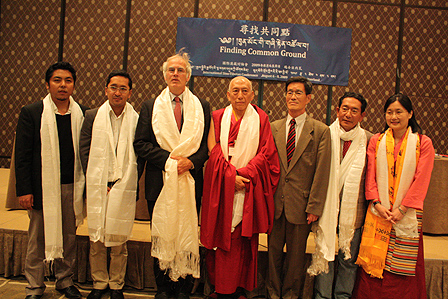
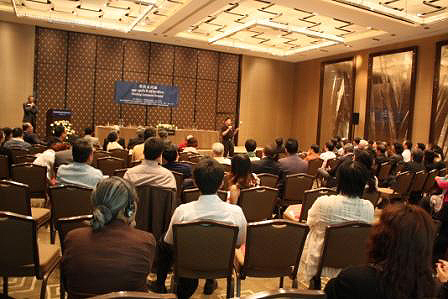
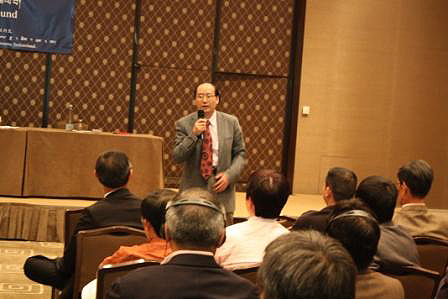
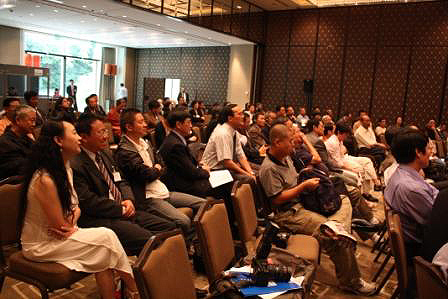
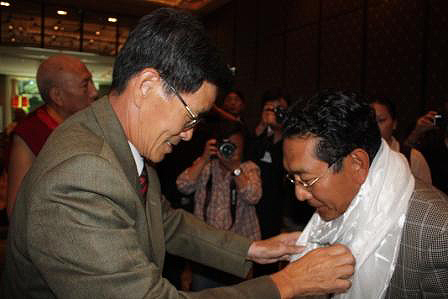
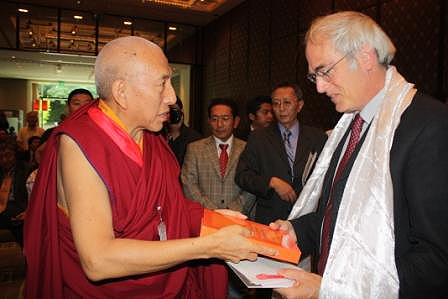
Geneva, August 7, 2009
Resolve the Issue of Tibet and Half a Million Careers Go Up in Smoke
The Reason for No Positive Response to Dharamsala’s Autonomy Proposal, Chinese Say
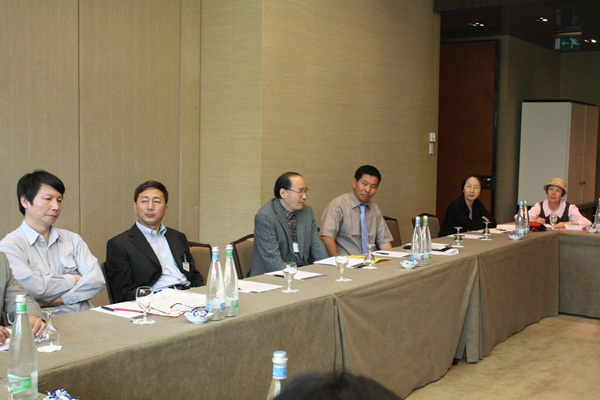
Geneva, 7 August – Yesterday, the Tibetans explained. The Chinese listened. Today, the Chinese talked. The Tibetans listened.
In a session crafted to both soul-search and brainstorm and rich with symbolism and resonant with historic potency, the more than 100 Chinese and Tibetans attending the Finding the Common Ground conference were divided into four groups to grapple with the challenge of moving the Sino-Tibetan dialogue process forward and reaching out to the Chinese people.
One Chinese participant said that one major stumbling block in this challenge is the network of organs in the party, government and army that constitute China’s vast anti-splittism bureaucracy. He said China’s current “anti-splittism rampage gives career and livelihood to at least about 400,000 cadres involved in the campaign. If the dialogue between Dharamsala and Beijing succeeds, these people will be out of jobs the next day. The speaker said that this bureaucratic grip on policy-makers in Beijing is the real reason why there is no positive response from Beijing to Dharamsala overtures and fresh ideas. Vested interests formulate policy and their interests outweigh China’s national interests.
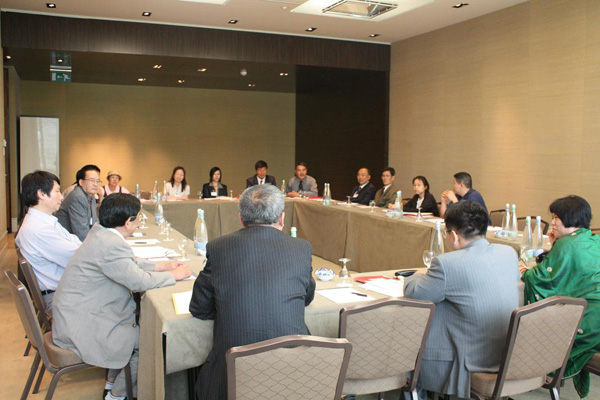
One participant said, “I am not for Tibetan independence but I support the right of the Tibetan people to their culture and religion. I’ve been to Tibet. Chinese condescension of Tibetans is obvious.” The speaker said that this was not helped by the distorted Chinese government propaganda. The speaker said, “We need to discuss how we can expose and discredit government propaganda. We can do this by writing on the issue of Tibet extensively and non-stop. We need to destroy big Han chauvinism.”
During the worshop session, two groups were assigned to discuss and come up with fresh ideas on how the Sino-Tibetan dialogue process can be advanced. The other two were assigned to come up with new ideas on how to strengthen the ongoing outreach to the Chinese people. The common theme for the four groups is Tibet-China interface: the Chinese perspective.
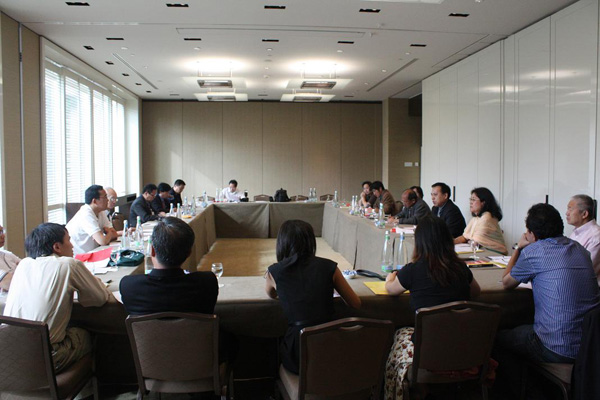
Given the range of issues that are being discussed and the vigour with which ideas are expressed and exchanged make this conference go beyond the past Sino-Tibetan dialogue conferences that constituted Tibetans-have-suffered-and-Chinese-apologize type. Both His Holiness the Dalai Lama’s encouragement yesterday to never give up and Kalon Tripa, Samdhong Rinpoche’s responses to the wide-ranging questions seem to have given a new lease of life to the interface between Tibetan exiles and the Chinese interested in the issue of Tibet.
One Chinese participant said, “If we want to decide the issue of Tibet, we first must decide on the issue of the return of the Dalai Lama to Tibet. If we manage to decide on this issue, everything about Tibet can be easily decided.” The speaker said, “This is because the Dalai Lama is not only the leader of the Tibetan people but has become the leader of the Chinese. Because of this, his return should take place without any pre-condition, His wish to go on a pilgrimage to Wutai Shan is his right.”
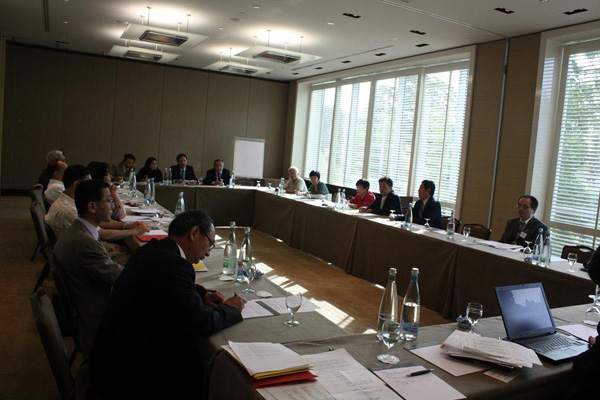
Another participant responded to this suggestion by saying, “The authorities fear that even a visit by the Dalai Lama to Tibet or China will unleash strong latent forces which the authorities would not be able to control and hence no positive response from the authorities for permission for a simple pilgrimage to Wutai-shan.” Wutai Shan is considered by Tibetan and Chinese Buddhists alike as the abode of Manjushri, the Buddha of Wisdom.
Another speaker said, “I have work with the People’s Daily for more than 20 years. Then I had no knowledge of Tibetan culture. Only thing I knew was something vague about Shambala. Now it is our collective responsibility to understand and dessiminate the values of Tibetan culture to people in China.”
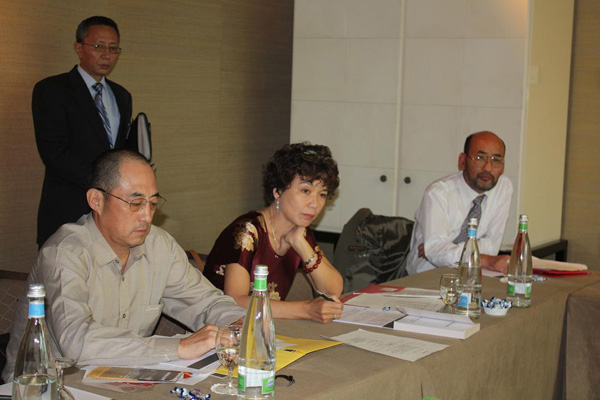
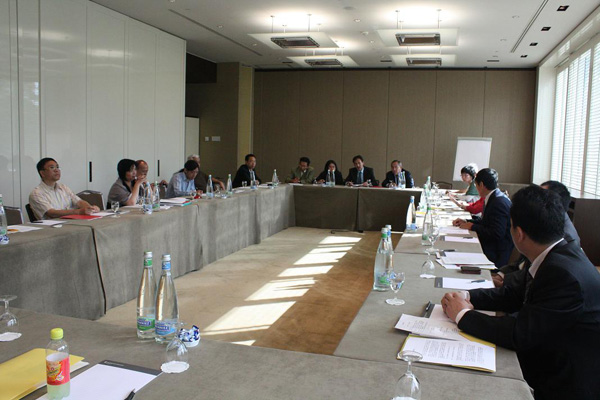
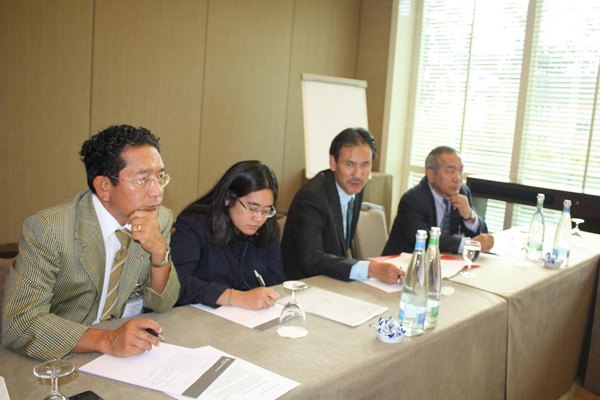
Geneva, August 6, 2009
'Expect No Miracle, But Strengthen Sino-Tibetan Friendship'
His Holiness the Dalai Lama Urges Tibetans and Chinese Scholars to Be Ever Determined in Finding a Just Solution
Geneva, 6 August – “The issue of Tibet needs to be solved. How to do it is something we need to discuss,” His Holiness told a gathering of Chinese and Tibetan scholars and officials at a conference organized jointly by the International Fellowship of Reconciliation and the Swiss-Tibetan Friendship Association.
His Holiness the Dalai Lama said he wanted to hear new ideas and suggestions from the Chinese brothers and sisters on how the issue of Tibet can be resolved based on the Middle-Way Approach. His Holiness said, “The purpose of our meeting is that obviously there is a problem. In Tibet, there is a crisis. Huge demonstrations were there all over Tibet. Severe restrictions were imposed. These demonstrations grew out of grievances through the generations. Most of the people who participated in the demonstrations are young. There is a need for a realistic response.” (Click here for full text of His Holiness the Dalai Lama's speech)
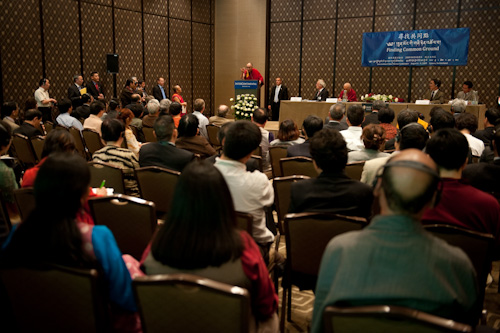
On the other hand, His Holiness said, “Our contacts with the Chinese government is becoming difficult. So we are reaching out to our Chinese brothers and sisters. There is growing support.” His Holiness said that to date there were more than 600 articles written in Chinese, all positive, on the issue of Tibet. “So it is our mutual responsibility to solve this issue without separation,” His Holiness the Dalai Lama said.
His Holiness the Dalai Lama said that it is important for those Chinese scholars who understand the issue of Tibet to write and make things clear on the issue of Tibet to the rest. For the Chinese scholars to understand the issue better His Holiness said he made it a point to frequently meet as many Chinese as possible. His Holiness said, “This is an enlarged meeting. I expect no miracle. But this forum is one to strengthen friendship between Chinese and Tibetans.
In the morning His Holiness held two meetings, one with the Chinese and the other with the international media. In the after His Holiness inaugurated conference called Finding Common Ground. This conference will go on till 8 August. His Holiness the Dalai Lama inaugural address was followed by an address by Yan Jiaqi, a leading social scientist and served as a senior adviser to Zhao Ziyang, the ousted prime minister of China who passed away in 2005.
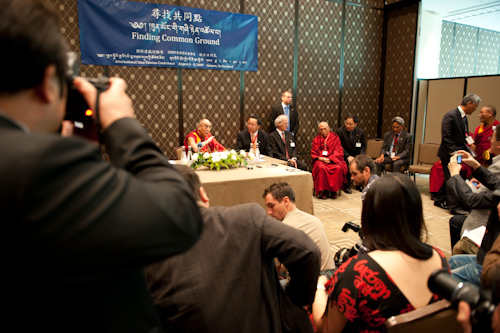
Yan Jiaqi said His Holiness the Dalai Lama represented not only Tibetans in exile but Tibetans in Tibet. Yan Jiaqi listed all the qualities of His Holiness the Dalai Lama, his selflessness, his sense of compassion and his ability to promote non-violence. Yan Jiaqi said all these qualities gave great strength to the Tibet movement. He said, “In China I did not realize the power of religion. Now I realize the power of religion.” He added that it is the right of every Tibetan to return to Tibet.
Professor Samdhong Rinpoche, Kalon Tripa, also addressed the delegates. (Click here for full text of Kalon Tripa's speech)
After the inaugural session, Professor Samdhong Rinpoche spent about two hours fielding questions on a wide-range of issues from the Chinese audience, which all said was very useful to their understanding of the nature of the Tibetan struggle and the approaches made by the Central Tibetan Administration.
The next two days the plenary will be split into smaller groups so that fresh ideas can be discussed to help resolve the vexed issue of Tibet.
There are over 100 Chinese and Tibetan scholars attending this conference from more than 12 countries across the globe.
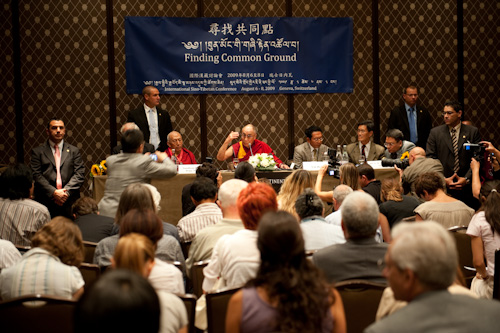
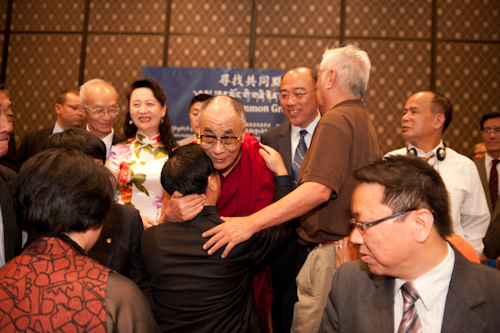
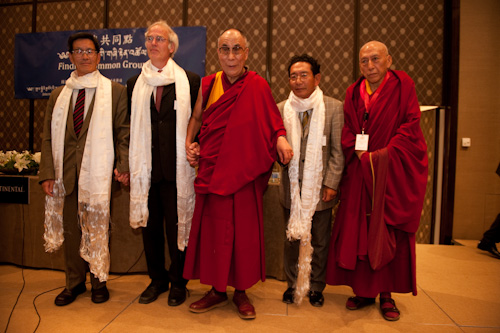
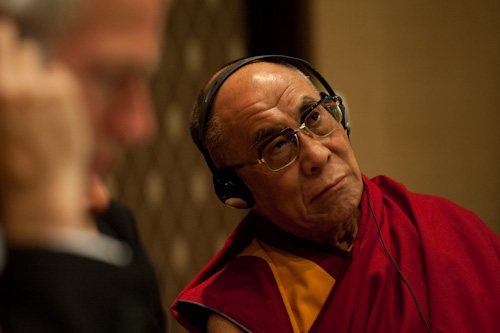
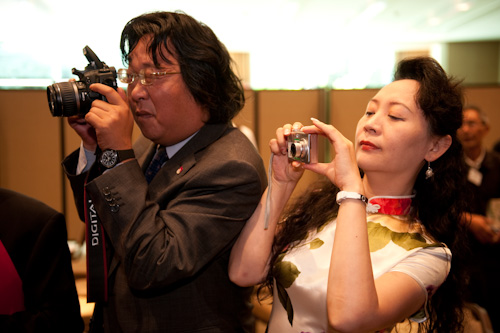
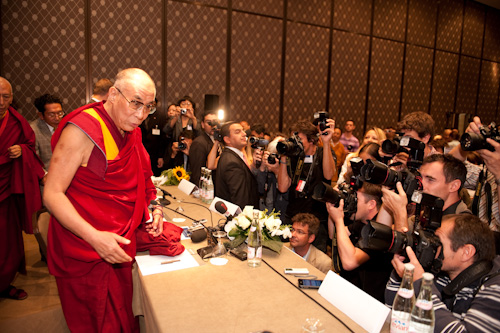
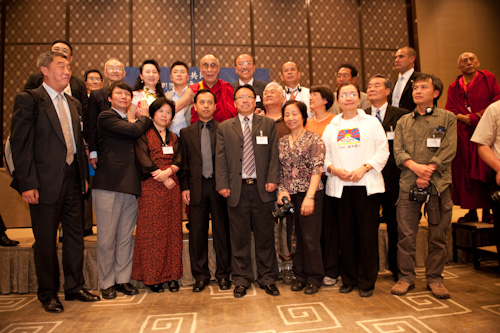
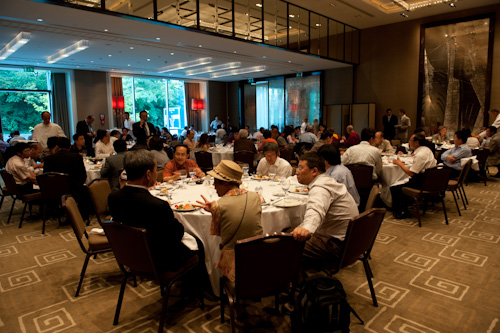
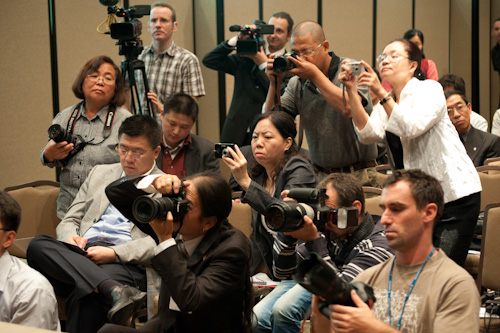
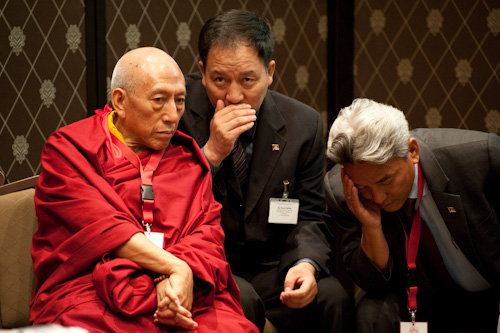
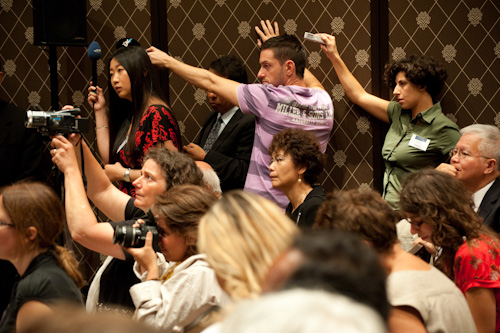
|
«
Finding Common Ground » - an international conference convened by |